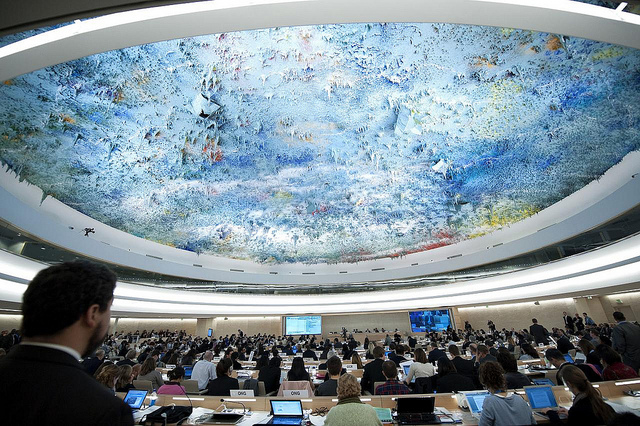
Credit: UN Photo/Jean-Marc Ferré
From January 27 to February 7, the Human Rights Council is holding its 18th Session of the Universal Periodic Review Working Group, to examine the human rights practices of 14 States through an interactive dialogue. [OHCHR] In order of scheduled review, the 14 States are: New Zealand, Afghanistan, Chile, Cambodia, Uruguay, Yemen, Vanuatu, Macedonia, Comoros, Slovakia, Eritrea, Cyprus, the Dominican Republic, and Vietnam. [OHCHR: Universal Periodic Review Timetable]
The 18th Session of the Universal Periodic Review is the sixth session to be held in the second cycle of the Universal Periodic Review (UPR). During the second cycle of the UPR, each UN Member State is expected to explain any measures they have taken to implement recommendations made during the first cycle, which was conducted between 2008 and 2011. Each State’s review may be watched on UN Web TV.
Civil Society Describes Human Rights Concerns in Afghanistan, Yemen, and Eritrea, among Other States
Alongside national reports written by each State under review, accredited national human rights institution and civil society stakeholders may also contribute information on the implementation of human rights obligations. For example, prior to Afghanistan’s review, the the Afghanistan Independent Human Rights Commission submitted a report highlighting several issues of concern: the ongoing imposition of the death penalty, the practice of torture to obtain confessions from detained individuals, gender inequality as an increasing number of cases were reported involving forced marriage and violence against women, and the usage of an informal justice system that deals with disputes and criminal cases at a village level. See Afghanistan Independent Human Rights Commission, Submission by the AIHRC under the Universal Periodic Review Process (August 2013). This report was included in the summary of civil society information. See UN Human Rights Council, Summary prepared by the Office of the United Nations High Commissioner for Human Rights in accordance with paragraph 15 (b) of the annex to Human Rights Council resolution 5/1 and paragraph 5 of the annex to Council resolution 16/21: Afghanistan, UN Doc. A/HRC/WG.6/12/AFG/3, 8 November 2013.
Civil society organizations reporting on Yemen have observed repeated grave incidents resulting from political protests in 2011 when security forces reportedly reacted with excessive force, causing death and injuries to a large number of peaceful protestors. Groups like Amnesty International and Human Rights Watch have further expressed concern regarding the arbitrary detention of individuals held for prolonged periods without charge and subjected to torture and ill-treatment. See UN Human Rights Council, Summary prepared by the Office of the High Commissioner for Human Rights in accordance with paragraph 15(b) of the annex to Human Rights Council Resolution 5/1 and paragraph 5 of the annex to Council resolution 16/21: Yemen, UN Doc. A/HRC/WG.6/18/YEM/3, 7 November 2013.
Several civil society stakeholders responded to the Eritrean national report regarding the government’s implementation of the first cycle UPR recommendations. Gender equality is one issue of concern, as reported by Sexual Rights Initiative, which explained that while Eritrea has signed various international conventions relating to women’s rights, women are still perceived to have inferior status to men and may be subjected to early and forced marriages.
Among other issues, Human Rights Concern Eritrea discussed Eritrea’s control of its borders, and strongly urged the government to revoke its shoot-to-kill policy for individuals attempting to leave Eritrea illegally. It additionally recommended that the government establish adequate mechanisms to ensure prompt and effective investigation of all allegations of torture and ill-treatment in State custody. See UN Human Rights Council, Summary prepared by the Office of the High Commissioner for Human Rights in accordance with paragraph 15(b) of the annex to Human Rights Council Resolution 5/1 and paragraph 5 of the annex to Council resolution 16/21: Eritrea, UN Doc. A/HRC/WG.6/18/ERI/3, 4 November 2013.
With regard to each country under review, the Office of the High Commissioner for Human Rights also compiles the relevant findings and reports made by other UN human rights bodies, for the Human Rights Council’s consideration. All UPR documentation relevant to each State, for both the first and second cycles, can be found through the UPR Documentation page.
The Universal Periodic Review Process
First established in 2006, the Universal Periodic Review is a cooperative mechanism used to assess each UN Member State’s fulfillment of its human rights obligations and commitments. The review is based on information submitted by the State, national human rights institutions, civil society organizations, and other UN human rights bodies.
During its review, each State will engage in an interactive dialogue with members of the Human Rights Council for a period of 3.5 hours. The State under review reports on its human rights record, and other States make comments and recommendations, which the State under review may later accept or reject. The final outcome report is adopted by the Human Rights Council during a session in which both States and accredited civil society organizations may make oral comments.
The 18th Session will conclude on February 7. The final outcome reports are expected to be adopted by the plenary of the Human Rights Council at its 26th Regular Session, which will take place from June 10 to 27, 2014. [OHCHR]
For more information about the process, see IJRC’s informational resources on the Universal Periodic Review, including the Primer for Advocacy Opportunities with the Human Rights Council, and the Office of the High Commissioner for Human Rights’ Basic Facts about the Universal Periodic Review. As the 18th Session continues, highlights of each State’s review will be posted on the 18th Session’s webpage.
